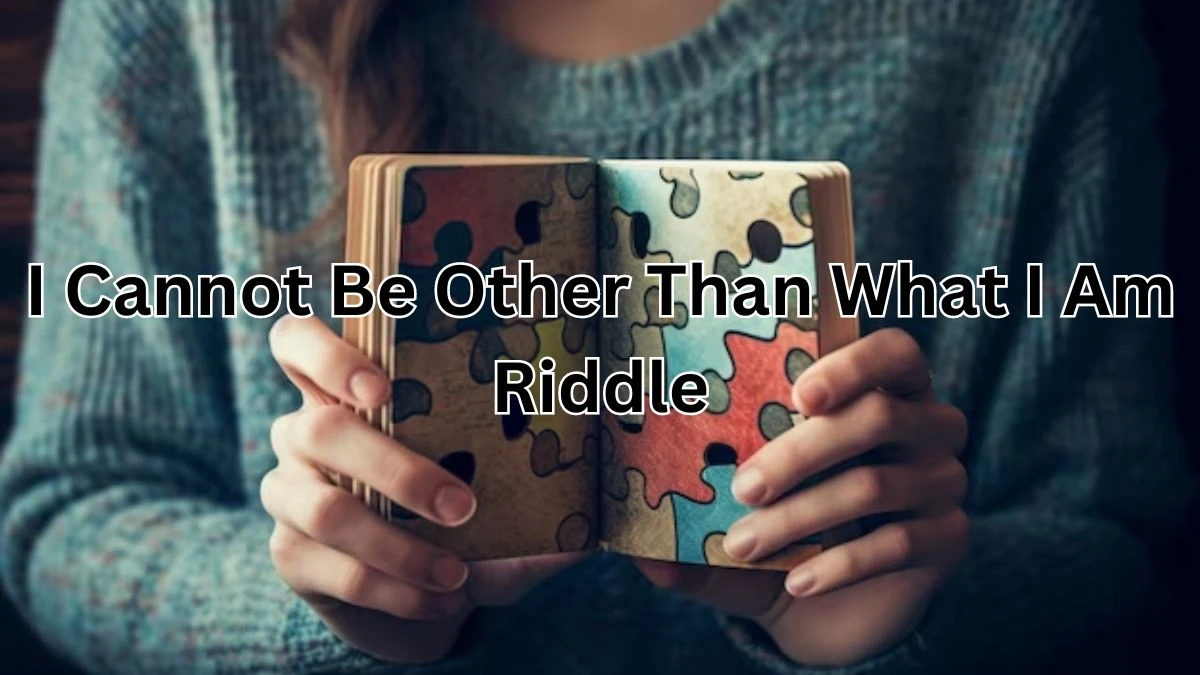- Rojgarlive »
- Riddle »
- I Cannot Be Other Than What I Am Riddle and Answer
I Cannot Be Other Than What I Am Riddle and Answer
by S Samayanka
Updated Feb 10, 2024

I Cannot Be Other Than What I Am Riddle
The riddle "I cannot be other than what I am" signifies an inherent identity or role that cannot be changed. It reflects the concept of a prince in a monarchy, whose status as a potential king is predetermined by birth. The phrase "Until the man who made me dies" refers to the current king, whose death is necessary for the prince to ascend to the throne. The lines "Power and glory will fall to me finally, Only when he closes his eyes" emphasize that the prince will inherit the authority and prestige of kingship only upon his father's demise. This riddle cleverly encapsulates the idea of succession within royal families, where the next ruler's fate is tied to the passing of the reigning monarch.
Riddle:I cannot be other than what I am. Until the man who made me dies, Power and glory will fall to me finally,Only when he closes his eyes.
I Cannot Be Other Than What I Am Riddle Answer
The riddle "I cannot be other than what I am" points to the unalterable identity of a prince in a monarchy. The answer lies in the dynamics of succession: the prince will become king only upon the death of his father, the current king. This inevitability is expressed through the lines "Until the man who made me dies." The riddle highlights the prince's dependency on the passing of his father for assuming the throne, symbolized by "Power and glory will fall to me finally, Only when he closes his eyes." Essentially, the riddle reveals the prince's predetermined role and the condition under which he can fulfill his destiny as a ruler. It ingeniously captures the essence of royal inheritance and the transition of power from one generation to the next within a monarchy.
Answer: "Prince"
What is Riddle?
A riddle is a form of enigmatic expression that challenges the intellect and encourages creative thinking. It typically presents a puzzling question or problem, often in a metaphorical or allegorical manner, with the goal of teasing out a clever and unexpected answer.
Riddles have been an integral part of human cultures throughout history, serving as a source of entertainment, mental stimulation, and sometimes even educational tools. They exist in various forms, from verbal puzzles to written or visual conundrums. Riddles often require lateral thinking, as they demand individuals to approach problems from unconventional angles to arrive at a solution.
In essence, a riddle is a playful and imaginative exercise that invites individuals to engage their cognitive abilities, fostering a sense of curiosity and the joy of unraveling mysteries. Whether used for amusement, social interaction, or intellectual development, riddles endure as timeless expressions of human ingenuity and the universal desire for mental challenges.
Benefits of Solving Riddle
- Mental Exercise: Engaging with riddles provides a mental workout, enhancing cognitive abilities and boosting critical thinking and problem-solving skills.
- Language Development: Riddles, often filled with wordplay and clever language usage, contribute to the enrichment of vocabulary. Regular exposure improves linguistic creativity and proficiency.
- Cultivation of Creativity: The process of unraveling riddles encourages thinking outside conventional boundaries, fostering creativity and imaginative thinking.
- Entertainment and Social Interaction: Solving riddles is an enjoyable activity, offering entertainment and amusement. It can be a social experience, promoting interaction and friendly competition.
- Educational Insights: Riddles often convey cultural or historical insights, serving as a playful means to learn about language, traditions, and societal aspects. They can be incorporated into educational settings for engaging learning.
- Confidence Building: Successfully solving challenging riddles instills a sense of accomplishment, boosting self-confidence, and encouraging perseverance when faced with mental challenges.
- Memory Enhancement: Recalling information from riddles contributes to memory improvement. The mental effort involved in solving them strengthens memory retention.
- Logical Reasoning Development: Riddles typically follow a logical structure, guiding individuals through a sequence of thoughts or deductions. This aids in the development of logical reasoning skills.
I Cannot Be Other Than What I Am Riddle - FAQs
A riddle is a puzzling question or problem that challenges the intellect and encourages creative thinking.
The answer is "Prince," symbolizing the unalterable identity and predetermined role within a monarchy.
Solving riddles provides mental exercise, language development, cultivates creativity, offers entertainment and social interaction, and imparts educational insights.
Riddles, filled with wordplay and clever language usage, enrich vocabulary and improve linguistic creativity and proficiency.
Engaging with riddles enhances critical thinking, problem-solving skills, memory retention, logical reasoning, and boosts confidence.




